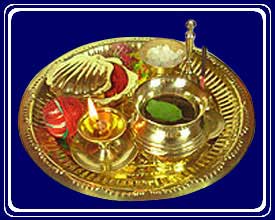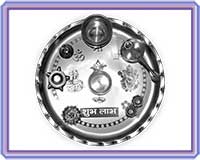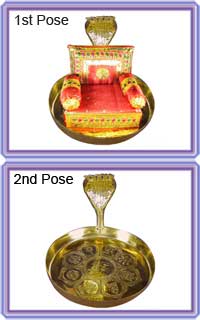Creating a Sacred Space: The Significance of Thrones for Placing Idols of Gods and Goddesses
A throne, in its essence, is more than just an ornate piece of furniture; it is a symbol of power, authority, and reverence. When it comes to religious practices, thrones hold an even deeper meaning. Placing idols of gods and goddesses on thrones is a practice that has been observed in various cultures across the world for centuries. This act is more than just a physical arrangement and it is a representation of the divine connection between humans and their deities.Symbolism of Thrones for God & Goddess
Thrones are often associated with royalty, leadership, and the divine right to rule. Placing idols of gods and goddesses on thrones elevates them to a position of honor and respect, reflecting their exalted status in the spiritual realm. This act symbolizes the belief that these deities hold the authority over the universe and are the ultimate source of guidance, protection, and blessings.Creating a Focal Point
In many religious traditions, thrones act as focal points within a sacred space. They draw the attention of worshippers and visitors, serving as a reminder of the presence of the divine. This focal point encourages devotees to direct their thoughts, prayers, and meditation towards the divine beings represented by the idols. The throne, as a physical representation of divine authority, becomes a conduit for communication between humans and the spiritual realm.Enhancing the Aesthetic
Thrones for idols of gods and goddesses are often crafted with intricate designs, adorned with precious metals, gemstones, and intricate carvings. This aesthetic enhancement is not merely for superficial beauty; it reflects the belief that the divine deserves the finest craftsmanship and materials. The grandeur of the throne also contributes to the sense of awe and reverence that worshippers experience when in the presence of the deity.Cultural Significance of Throne for God & Goddess Different cultures have their own interpretations of thrones for idols. In Hinduism, for example, the throne is known as an "Asana" and is regarded as a seat of honor for the deity. In Christianity, thrones are often associated with images of God, Christ, and saints seated in glory. Regardless of the specific cultural context, the underlying principle remains the same - thrones are a means of expressing devotion and establishing a sacred connection.
 Google has chosen Shaligram Shala ( shaligram.com) as the world's first 5 star
Google has chosen Shaligram Shala ( shaligram.com) as the world's first 5 star  rated Rudraksha supplying Company
rated Rudraksha supplying Company 



























































